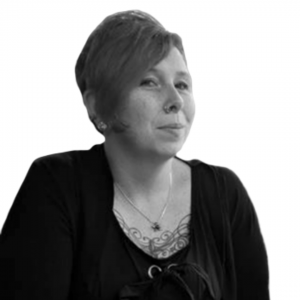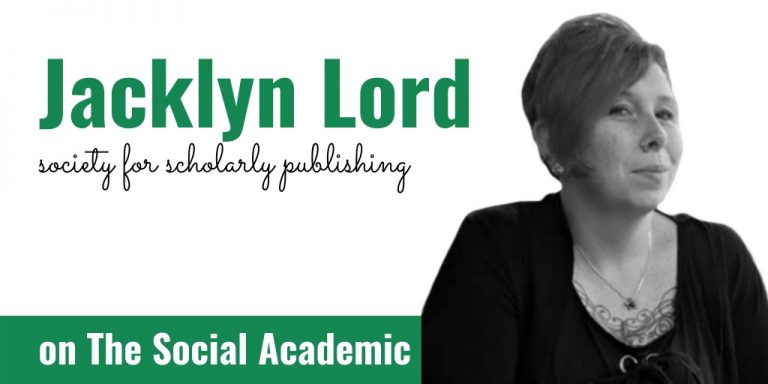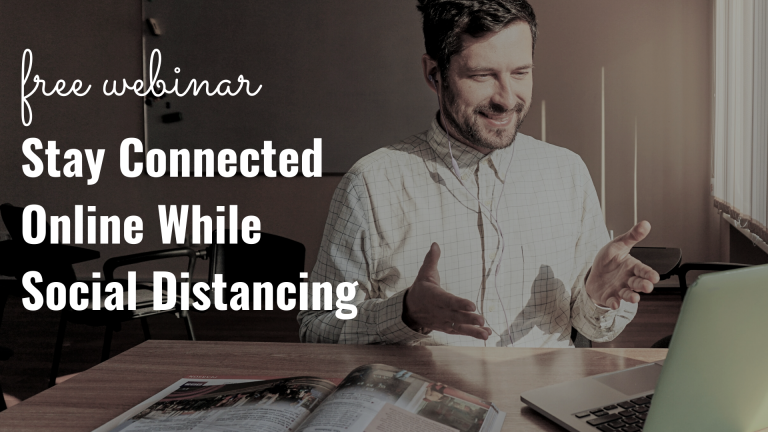A Chat with Jacklyn Lord of the Society for Scholarly Publishing
Jacklyn Lord is a media communications professional who loves pop culture and social media

Jacklyn Lord manages marketing and communications for the Society for Scholarly Publishing, which connects people who work in scholarly communications and publishing together.
In this interview we talk about her career path and long-time interest in online identity.
This is a difficult time for people around the world. Higher Education especially is going through major transitions as faculty and students adapt to online learning in the midst of the COVID-19 pandemic.
One of the reasons I still wanted to share this interview is Jacklyn’s enthusiasm for connecting with people online. And, her openness about that journey. In this interview we talk about online identity, privacy, and how our thinking about that changes over time.
What does it mean to be online?
This is something many in our community are thinking about, some for the first time.
How can we stay connected?
And, where?
I hope this interview inspires you to seek out the friends and conversations you enjoy online.
Meet Jacklyn Lord
Subscribe to the podcast on Spotify | YouTube | TuneIn | ListenNotes | Blubrry
Jennifer: Hi Jacklyn, I’m so glad to have you here today on the show. To get us started, I’d love if you could introduce yourself.
Jacklyn: Sure!
So my name is Jacklyn Lord. And currently I work at the Society for Scholarly Publishing as a Marketing and Operations manager.
But, I think of myself as much more than that. I think of myself as a media communications professional.
I’m a really big pop culture and media nerd. Which makes my job and my hobby kind of blend together in a really nice way.
Jennifer: Oh, I love it.
Jacklyn: I’ve been really interested in sort of media studies, and the self, and society in some form since I was a teenager.
Jennifer: That’s great, so it’s really found a way into your career – into your work.
Jacklyn: Absolutely, absolutely.
The Society for Scholarly Publishing advances the field and helps connect people

Jennifer: I love that. So your work sounds really cool. But how did you end up at the Society for Scholarly Publishing? What do they do? And what is their goal?
Jacklyn: Sure, so the Society for Scholarly Publishing (SSP) is a non-profit industry group that advances the field of scholarly publishing, specifically connecting individuals who work in scholarly communications or scholarly publishing to each other.
And keeping them abreast of trends because it’s really hard to know what’s going on in your field while you’re doing the work to be in the field as well.
So we represent
- publishers
- librarians
- service providers
- editors
- authors
- researchers
- communications professionals
Anybody who’s doing knowledge work in the academic arena.
Jennifer: That’s great. You’re helping to connect those people and really provide a place for them to stay up-to-date on things. Is that right?
Jacklyn: Precisely, so my job is I do marketing and communications for the society. So I’m pushing out all of our resources.
I’m sharing all of the different trends that we might be giving a webinar on. But I’m also helping members get in touch with one another.
We’re starting a couple of new programs in addition to our mentorship and our fellowship programs. So my job is helping everyone sort of talk to each other around these ideas.
Jennifer: Oh I love that. And that’s so necessary.
Especially because you’re bringing people together from all areas of publishing and trying to figure out how to best communicate with them. So your role is so important!
Jacklyn: Yes, and we’re trying to get them to talk to each other too.
Like we want the people who are producing the knowledge to be talking to the people who are buying the knowledge.
And we want those people to be talking to the people who are trying to access that knowledge too.
Jacklyn’s long, windy career path blended her interest in psychology, media studies, and communication

Jennifer: Yeah, that sounds really interesting. How did you end up in that role?
Jacklyn: So, it’s kind of a long, windy path.
I started out at the very beginning after I left undergrad. I had two internships. One is psychology, and one in media studies.
I was working as a research assistant and a project director. And they were very perfect.
But I needed a way to bring them together somehow.
So you know, I was studying all of these ideas about how media is changing people as I’m learning more about media studies and independent media.
But I’m also studying a lot of social psychology.
And in my head, I was just like those are talking to each other. How do we make them talk to each other?
So I decided grad school would be the place to go do that. So I went to grad school and during that time I got a lot more experience making those two things talk to each other.
And this was…I’m dating myself a little bit…but this was about 10 years ago before the idea that the internet was real life was just starting to take hold.
I went to grad school and I was like yes, this makes sense to me. I don’t know what I’m gonna do with it…but we need to be thinking about ourselves on the internet in this very real way.
And then after grad school I freelanced for a while and was a consultant you know, on lots of different things. And then I was starting to figure out what would be the best way to do this?
And that’s how I sort of came into scholarly communication.
Jennifer: I love it. Yeah, that’s really interesting. Yeah, I’m not going to edit that out because I think that the journeys we take to get to the roles we’re in is really important.
And it sounds like what really motivated you was both the psychology aspect and the communication aspect. And putting those two things together was what kind of held your interest in terms of career paths.
Jacklyn: That’s absolutely right. I was always thinking, how can I apply this over here to this other thing I was working on?
And I would say maybe only in the last 5 years have I been doing something where I feel like okay, this is touching on all of my interests in one job. Rather than having you know, a couple little side gigs and a main job.
Jennifer: Right. Well that’s great. I love that.
Jacklyn: I feel really, really lucky you know. In that way.
Jennifer: Yeah, absolutely. I think it’s so hard for us all to find what exactly fits our personalities and our interests so that’s awesome.
Thanks for telling me about your journey to get there.
Jacklyn: In retrospect it does seem like such a calculated move. Like oh, that makes sense. And that position makes sense. And the context of everything…But you only know that looking back, right?
Presenting yourself online, identity and internet culture

Jennifer: Only looking back, definitely.
So one of the things that we all struggle with is being ourselves online.
And you mentioned that was something you were interested in even 10 years ago. So I’d love to hear about you manage that balance on social media.
Jacklyn: Oh sure. So I got online as a preteen. So I’ve had a really long time thinking about how presenting myself in different online contexts…
Jennifer: Can I ask, were you on Facebook? Or MySpace?
Jacklyn: Oh no, I’m talking about Angelfire and GeoCities.
Jennifer: Yeah, yeah, yeah, yeah.
Jacklyn: Like in the late 90’s. I think I got my 1st screen name, my 1st AOL account I think in like 1995.
So I have a lot of familiarity with internet culture and customs just from being a resident for so long. Right?
Jennifer: Absolutely.
Jacklyn: But that then became informed by my studies of
- media studies
- communication
- identity
And sort of always thinking about front-stage self and back-stage self. And performance studies. And who am I presenting?
And I got really into playing around with that on the internet.
And now I like to think I’ve reached a very good blend of all of these different facets of who I am.
And that came through sort of learning best practices, but also keeping what felt good for me.
Like I don’t do everything that I might tell somebody to do. I kind of pick and choose what works best for me. And that’s a big part of how I manage to be myself when I’m online.
Pick and choose what works best for you

Jennifer: Yeah, you said you sometimes give other people advice that you don’t necessarily take. Can you give an example of that?
Jacklyn: Sure, so let’s talk about Instagram. Everyone is really into Instagram right now.
I am not on Instagram. Not for any particular reason other than I’ve got my networks and I’m doing them well. So I’m gonna stick with them.
The way that I engage with online content is not primarily a method that would lend itself to Instagram. I could do that…but I would rather spend my energy on the things I’ve got going and do them well. Rather than switch over to another platform just because that’s where everybody is.
Jennifer: Yeah! Oh yeah, I actually completely agree with that advice.
I always tell people to spend time where you’re already spending time and enjoying yourself. And if you feel like something is gonna take up too much time or energy to do the way you want to do it, just…It’s okay to let someone else do that.
Jacklyn: Just pick one, and do it really well. Right?
Jennifer: Yeah.
Jacklyn: And that gets back to what I was talking about, playing around with it.
There was definitely a time when I had a profile on every major site. And I thought, this is the way to do it. And it was just too much.
Jennifer: Overwhelming.
Jacklyn: It wasn’t me. I didn’t want to be on all these other sites but I felt like I had to be there.
Jennifer: When you were on all those sites, can I ask, were you able to connect with people on those sites?
Jacklyn: No, of course not.
Jennifer: Yeah, yeah.
Jacklyn: No, I was there in case somebody searched for me. Which I mean that might have been a good plan a few years ago, but it’s not a good approach anymore.
Jennifer: Yeah because you have to actually have conversations and be social on social media.
Jacklyn: Right, I need to actually see that you’re here.
Jennifer: Exactly.
Enjoying this interview so far? Subscribe to The Social Academic for advice articles and interviews like this right to your mailbox.
Subscribe to The Social Academic blog.
The form above subscribes you to new posts published on The Social Academic blog.
Want emails from Jennifer about building your online presence? Subscribe to her email list.
Looking for the podcast? Subscribe on Spotify.
Prefer to watch videos? Subscribe on YouTube.
“Everyone feels really bad when they hear the word branding”

Jennifer: So, as a marketing person, the word ‘branding’ isn’t bad. But a lot of academics think it is.
I’m curious, how would you describe branding?
Jacklyn: I think you’re totally right.
And it’s not just academics. Everyone feels really bad when they hear the word branding.
And I think that’s in part because branding and marketing is the driver behind so much of our media culture, right?
Buy these shoes. Or buy this car. And make a statement about it.
But if you think about your own personality. That in a way is your brand. Right?
Your personality is just how do all these different parts of who you are fit together in one unified story.
Personal branding, to me, is just spending time thinking about that.
So, thinking about what are the different selves that I have? And how do they fit together in a way I want everybody to know about?
Jennifer: Yeah.
Jacklyn: I think that we are seeing sometimes in marketing and advertising…we’re seeing this play between individuals and businesses where businesses are emulating individuals. And now we’re kind of as individuals emulating what businesses have done with their branding.
And I think sometimes for some of us that can feel like of icky.
Jennifer: Icky, that’s a good word for it.
Jacklyn: But it doesn’t have to if you think of it as you’re taking control of your own narrative.
Because somebody’s going to look for you, what are they gonna find?
Do you want them to find what you’ve put out there? Or do you want them to find whatever your friends have tagged you in. Or whatever anybody else thinks is important about you.
Jennifer: Yeah, I think that’s so important. It’s not just about how we see ourselves.
It’s about how other people find us. Even if they’re not looking to discover those photos your friends tagged you in. They just want to know a little bit about you. So yeah, I completely agree.
Jacklyn: And it’s not even just in a job-interview kind of context, because I think that’s where we all think of it. We all get on the job market and are like, okay gotta update my profiles, gotta get a good headshot. But it’s so much more than that. You know?
I like to think of it as, what would it look like if I was to stop by your cubicle?
Jennifer: Mmmm.
Jacklyn: So it’s who you are at work, but it’s a little bit more. There’s a little more personality there.
Some of the things that I’ve been thinking about too since I got into this line of work specifically, is that a lot of scholars think that there’s something inappropriate about talking about themselves as a brand or their work as something that other people should talk about.
And that I think might have held true when our audiences were smaller.
But there’s just so many people producing knowledge, producing content.
And if you’re not telling me about it, I’m gonna miss it.
Jennifer: There’s so much content. And I’m sure you know more specifically from the publishing side how much is published each year.
Jacklyn: Oh yeah.
If you’re not making your work seen, it might not be

Jennifer: So being able to talk about your own [work] is so important.
Jacklyn: Well and I think it’s unsettling because nobody wants to think that their work isn’t going to be seen.
But that is a fact that if you’re not making it seen, it’s not going to be seen.
Because there’s lots of research that shows most people don’t read academic books. Most people don’t read journal articles.
So in my opinion, and this is sort of how I approach it from deep down inside, is that that work is really valuable. Why don’t you want to tell anybody about it?
Jennifer: [Laughs.]
Jacklyn: Why did you do it if you won’t tell me about it?
Jennifer: Mhmm. Or tell someone. Tell your own field. Yeah I know exactly what you mean.
Social media especially helps us reach really niche audiences sometimes. If you have a hashtag that only people in your field are using and you can use that to share your work with them in a global context…Why not take 10 minutes out of your day to do it?
Jacklyn: Well and the thing I really like too is that it breaks down the academia and practice divide.
If I’m a practitioner in…well as a marketing practitioner. I need to know best practices. And I need that to be based on data. I don’t want that to be based on somebody’s intuition.
If you’re telling me that you conducted a recent study that found people are only spending like 2 seconds on a particular platform, well that’s really good to know.
And that’s going to redirect what I’m doing in practice.
But if you didn’t tell me that, then I’m wasting all my time. And you’re wasting your time because nobody’s gonna find that out.
And you know, I don’t have access to a lot of scholarly journals. That’s a whole nother issue. You know, paywalls and things like that. I think that social media can be a way to, not circumvent those, because I think there’s a lot to be said for compensating people who produce that knowledge. And we can get into you know, getting into the publishing models as they are now…that is…yeah we can’t have that discussion right now. I wouldn’t even know where to begin on that.
But I think using, let’s go with Twitter, because I think Twitter is a great way to do this…
Using Twitter to boost who you might direct to those journal articles. To reach people who are outside of academia but who might be interested in those journal articles…Why wouldn’t you do that?
Jennifer: It seems like a simple question…
Jacklyn: Yeah…I can think of many reasons why someone wouldn’t want to, but…
Jennifer: I think it comes back to that idea of personal branding, and what it is to kind of talk about ourselves online.
Jacklyn: Mhmm. You know what humble bragging is, right?
Jennifer: Oh yeah.
Jacklyn: I think humble bragging gets a bad rap. But really we should all be practicing because no one else is gonna brag for you.
And clearly there are outliers where people are gonna talk about your work because it’s just outstanding.
But for most of us, you gotta brag for yourself. Especially in our culture which is so individualistic. You gotta be the one to pull yourself up.
You have to kind of swallow your maybe icky feelings a little bit. Does that make sense?
Jennifer: Yeah. I think that’s really good advice because what I’ve found with the faculty I work with is…once they try it once, and they get a good response they’re like “Oh, oh this is actually okay. People do want to hear about what I’m doing. And I was surprised by how many people responded and engaged with what I said.”
It usually takes just one swallowing of that icky feeling. Maybe two, maybe two if you’re on Twitter and not a lot of people have seen you tweet.
Jacklyn: Right.
Jennifer: But the point is the feeling comes quickly, that that was actually worth my time. That was worth me talking about myself and putting it out there. And I got the response I was looking for.
Jacklyn: I had a journal editor I worked with at a previous job who personally hated social media. She did not want anything to do with it at all.
And we talked at length about how her journal was really incredible but her reluctance to engage with social media was hurting the journal itself.
She would say, “I really want people to discover this, but I don’t know how they’re finding things.”
So we would have these long conversations about how you don’t have to put it all out there. I think that’s what some people think, especially about professionals might think. That social media is for everybody out there being wild, it’s for kids who don’t have reputations to worry about.
That’s part of it, yes.
But there’s this other part where you should be on there managing your reputation.
Jennifer: Because there are more than just kids there. There’s people of all ages.
And they’re all trying to find something, to find something that engages them.
So if that’s your content, if you’re not putting it out there, they’re not going to find it.
Jacklyn: Right, exactly.
Facebook is Jacklyn’s favorite platform, here’s why

Jennifer: So we talked about Twitter, is that your favorite social media platform?
Jacklyn: You know, I’m embarrassed to admit this but it’s not.
Actually Facebook is my favorite.
Jennifer: Oh, that’s great! I haven’t gotten that answer before, so I’m actually really glad you said it.
Why is Facebook your favorite platform?
Jacklyn: Wait, did you say nobody has said that before? [Laughing].
Jennifer: I ask this question to all of my interview guests. Almost everyone says Twitter, others have said Instagram. I don’t think anyone has said Facebook.
Jacklyn: I do love Twitter. I love Twitter. I was a late adopter but once I got in I was like yes, love it.
But I think the thing I love about Facebook is that, you know, it’s the thing we love to hate. It’s certainly wasn’t the first.
But it was so groundbreaking. And it continues to be so.
There’s something you need to respect about an idea that so has fundamentally changed everything.
I mean I’d be hard pressed to name something in my life right now that Facebook, or the operating principals behind Facebook, hasn’t changed.
And, I mean not only that. Not only giving it it’s due reverence…
I think it’s like tv in this way. It’s still where most people are. Right?
Jennifer: It is, isn’t it.
Jacklyn: You know, there’s lots of other huge social media. But everything always ends up on Facebook anyways. And to me there’s a lot to be said for the network of the people, for better or worse.
And that’s kind of a loaded way to think about Facebook.
Jennifer: [Laughs]. It is a little bit.
Jacklyn: It’s not exactly the network of the people.
But there are users for whom Facebook is the internet.
Jennifer: Right.
Jacklyn: And I think to blow that off is negligent.
Jennifer: So, you love Facebook. And it sounds like you’ve liked it for a really long time.
My question is, how do you use Facebook? Do you mostly connect with family and friends there? Do you use groups?
Jacklyn: It’s changed over time. And I’m definitely part of their new trending of pushing groups.
I almost exclusively am using Facebook for groups these days. And I think it’s kind of interesting…I mentioned being online for forever.
And now the way I feel like I use it, is in much the same way I used to use chat rooms.
You know, I’m a member of a couple of groups that I’ve made actual friends out of that. And I haven’t made an internet friend in that way in years.
So I think it’s going to be this trend, of getting away from the big megaphone, which is kind of what you can think of Twitter as. As like, I’m shouting at everybody and I hope somebody is listening. And some people are shouting back at us and sometimes we’re listening.
And I think Facebook now can be the way that we maybe go have these more intimate connections. That, for better or worse, are hard to have on other platforms.
I think that it’s walledness, the walledness of Facebook makes it conducive to having these private chats. Right, they’re not private because Facebook owns them, but..
Jennifer: They’re not as public. They’re not as accessible.
Jacklyn: They’re walled off.
Jennifer: Right.
Jacklyn: You can’t find them by Google.
Jennifer: Right.
Jacklyn: I think that…in my idealized thinking of the internet, those are the conversations people want to be having on the internet. They want to get to authenticity.
They want to get to those parts that maybe you don’t want blasted all over social media.
So I think that’s why I like Facebook. Because I do think it allows you…maybe not allows you. It forces you to reckon with both sides of yourself on the internet in a way.
Jennifer: Ooooh, I like that. So then it’s also more about the self and how you’re experiencing kind of talking about people and engaging with conversations.
So it’s not just about what you like about the platform but how it affects you.
Jacklyn: Yeah, yeah. Absolutely.
Jennifer: That’s really interesting.
Subscribe to The Social Academic blog.
The form above subscribes you to new posts published on The Social Academic blog.
Want emails from Jennifer about building your online presence? Subscribe to her email list.
Looking for the podcast? Subscribe on Spotify.
Prefer to watch videos? Subscribe on YouTube.
On having multiple accounts for work and family previously

Jacklyn: Especially as I’ve tried over the years to have multiple accounts in different instances, one account for work and one account for family. Even across platforms.
Jennifer: Do you still do that?
Jacklyn: Until I would say, if I’m being honest, until about a year and a half ago. Yes, I used to do that.
And then I kind of just decided to accept on some level that this online identity is never gonna go away. So managing 3 of them is hard. And it’s not fun.
So I just try to be really conscious about the one I do curate.
That doesn’t mean everything is really polished. Because that’s not who I am. I’m not a very polished person.
But that doesn’t mean I’m putting my worst moments up there either. Those go in the walled garden in Facebook groups.
Jennifer: [Laughs]. I love it. And I love that Facebook was your favorite and that you’re really actively using groups. I think that’s really interesting.
I also like Facebook groups. I spend, would say I spend more time talking in Facebook groups than I would be like on my Facebook wall or something.
So I definitely enjoy having conversations there. And I’ve also met people in groups that I’ve kept in touch with. Or I’ve found some really insightful things, or I’ve learned something from them. And I love that.
But I also find I have really good conversations on Twitter. So I do find that in both places. And maybe that’s because I’m talking about things that don’t necessarily need to be behind a wall. I’m talking about social media, or…
Jacklyn: Well the thing I love about Twitter is that it does expose me to more new ideas. And then what happens is I usually take them from Twitter over to whatever group I’m in.
Jennifer: Oh, that’s a great idea.
Jacklyn: I’m like, let’s talk about this. Because I might have opinions about it…
Jennifer: That you don’t want to share publicly.
Jacklyn: Right. Like I’ll share half of my opinion publicly. But then there’s maybe an asterisk that I don’t want to share. But that’s the part I do want to talk about with my peers.
Jennifer: And so that’s the part you bring to the Facebook group.
People can be mean online, here’s what you can do about it

Jennifer: So what don’t you like about social media?
Jacklyn: I know this is like everywhere these days, but I just hate how mean everybody is.
Jennifer: People get mean!
Jacklyn: I understand it in some way. You know, it’s our human nature that negative emotions drive more attention and more brain resources. I understand that. I understand why the algorithms work the way they do.
That doesn’t mean I don’t like it.
People are just really quick to assume the worst about somebody’s post. Where, we’re still in this spot where we’re not sure how to interpret text.
And emojis, I think, do a lot to get that meaning across. Even though some people think that’s like the death of language.
You know, I just hate how some of our worst inclinations, social media takes those and make those bigger.
Jennifer: It definitely amplifies it with the current algorithms a lot of the time.
Jacklyn: Of course. And it feels good too.
I’m certainly guilty of these. Of looking at something and being like, do you believe this garbage?
You know, so mission accomplished, your algorithm worked. But that doesn’t make it good. And I think that’s sort of what we’re seeing with Facebook pivoting to groups.
I think they kind of, if we think back a couple of years ago to the Cambridge Analytica scandal, they faced a lot of head for how ugly people can be online.
And so that’s, that’s my worst part of it.
We all agree that it’s terrible. But none of us are really doing anything about it.
Jennifer: So what would you say that you do in your own life?
When you come across something that’s mean that you’re like…that’s too much…what happens? Do you take that and go to your Facebook group, or…?
Jacklyn: I have been honestly, I’ve been reporting a lot now.
Jennifer: Yeah, yeah.
Jacklyn: I feel even is somebody, even if it’s borderline where that kind of…I don’t know if that’s hate speech, but I don’t want to see that. Whatever you’re doing, I don’t want to see.
I’ve become much more liberal with reporting things and blocking people. FOMO* be damned, I don’t want to see it.
Don’t let FOMO, or Fear of Missing Out, keep you from enjoying social media. Mute or block accounts that share things you don’t want to see.
Jennifer: Yeah, I think that’s a great idea.
I use mute. Like you can mute people. And so when you see someone whose saying really divisive things, but I don’t want to block them because I don’t know them, I just mute them. I can go on with my life and not really have that popping up on my feed every day.
Jacklyn: In some ways I am kind of my own biggest troll. I will get stuck reading those because I’m fascinated by how these people are playing out those dynamics.
But then I do have to take a step back and say, my mental health cannot take reading any more garbage comments today.
No matter how much I think I’m gleaning about how people are interacting. I still gotta walk away.
Jennifer: So you have to recognize. Because you’re interested in it. You’re interested in the psychology of the conversation.
You want to sit there and read all of them but you have to recognize when you have to take a step back.
Jacklyn: Very much so.
Jennifer: That’s funny.
My fiancé is always like, what are you so angry about right now?
And it’s always like some scandal in Higher Ed that I’m reading about on Twitter. I’m like this thing is going on!
And he’s like, you should put your phone down.
Jacklyn: Did you see this think is trending? This is crazy.
But see? Like it feels good to commiserate over that.
Jennifer: It does
Jacklyn: So you can understand why it’s so successful.
Jennifer: Absolutely.
Jacklyn: So you know, I’m flumoxed about it.
Because here we are being [social media] users who really enjoy what we do. But we also kind of know, it’s not the best for us.
Jennifer: That’s very true. But one thing that I like is that we’re both taking steps to kind of mitigate how we’re experiencing that.
And when we recognize that there’s an issue, trying to figure out when to step away is also something people should try to put into practice.
Because the longer we stare at it, the more angry we get. And the more likely we are to say something angry ourselves.
Choosing not to be on social as a professional in today’s world is like choosing not to have a resume

Jacklyn: And I think that’s maybe why some people choose to just not engage at all. But you know, that’s a choice you can make. You can.
But to me, choosing not to be on social as a professional in today’s world is like choosing not to have resume.
You can do that.
But I don’t know if it’s a good choice.
Jennifer: That is such a good answer.
Jacklyn: I do think of your social ‘brand’ is a more colorful version of your resume. A more personal version of your resume.
Jennifer: I would find it pretty strange if I searched for someone and couldn’t find anything.
Jacklyn: Yeah.
Jennifer: I would definitely be a little concerned.
Jacklyn: That’s almost more suspect these days.
Jennifer: Yeah, because you have to really actively trying to keep your name out of things I feel, to not come up in Google for social media or things.
Jacklyn: Yeah. And again, that’s fine. But then people are going to think, “Why can’t I find you?”
Jennifer: That will always be the question, definitely.
Jacklyn: And maybe you’ve got a totally legitimate reason. But the other person whose searching for you does not know that.
Jennifer: Yeah. Unless they find a way to actually reach you and talk about it, which is probably not their initial query in the first place, they’re never gonna know that.
Jacklyn: They’re just trying to find out who you are and like a snippet about you.
Jennifer: Yeah. Even a couple of sentences would be like, oh okay, that’s a person.
Jacklyn: Right.
Subscribe to The Social Academic blog.
The form above subscribes you to new posts published on The Social Academic blog.
Want emails from Jennifer about building your online presence? Subscribe to her email list.
Looking for the podcast? Subscribe on Spotify.
Prefer to watch videos? Subscribe on YouTube.
What Jacklyn wishes scholarly writers knew more when it comes to social media

Jennifer: So my next question is, what do you wish more scholarly writers knew when it comes to social media?
Jacklyn: I wish they knew that it’s okay to not do it perfectly.
Jennifer: Oh, that’s good. Yeah.
Jacklyn: I think that it can feel really intimidating to do it just right. Especially when you can see, you know…oh god I’m gonna blank on her name. There are a couple of sociological professors that I follow on Twitter that are just amazing with their social media presence. They combine their personal lives and their professional lives all in one beautiful package.
It’s okay not to do it like that.
Do it in a way that works for you. And if that involves only talking about work, and nothing else, that’s okay.
I followed up with Jacklyn after our interview. She said “@JessicaCalarco is one of the people I was thinking of…she studies kids, families, schools, and inequality, and does an amazing job of sharing who she is and why her research is relevant and personal.” Dr. Jessica Calarco is an Associate Professor of Sociology at Indiana University and author of A Field Guide to Grad School: Uncovering the Hidden Curriculum (Princeton 2020).
Jacklyn: But then also, if you do make a mistake, it’s okay. It’s going to be the nice thing and the bad thing about social media is that it’s gonna be gone in 20 minutes.
Jennifer: That’s true. And you could always delete the post or hide it from your wall if you’re on Facebook. So there are steps you can take if you make a mistake.
Jacklyn: Yeah.
Jennifer: I make typos all the time. I don’t go back and correct them because I’m like that’s okay, people knew what I meant.
Jacklyn: And I think especially for academics, that’s sort of transparency about flaws is really…
And I say this as somebody who is a recovering perfectionist.
Like you don’t want to let people know you make typos. That you used a wrong word. Maybe you don’t know what a word meant.
That’s okay though. That humanizes you, you know?
Jennifer: People definitely relate to it. They’ll engage with it more often.
If there’s a small typo that’s even funny, they’re like let me correct this word for you. And then you start a conversation because they’ve read what you’ve said.
Jacklyn: Right.
Jennifer: Yeah, and I said typo because I think that when people think ‘mistake’ on social media, they think about something bigger that will like effect their job. Or that will get them fired.
Jacklyn: They’ll be the next trending hashtag.
Jennifer: Yeah. But most people don’t make those mistakes. Like you have to be pretty mean or you have to say something really divisive.
You would know. I imagine you would know that’s something you should say. Maybe you questions it first.
But the mistakes that most of us make are like a typo, maybe missing a word. It happens all the time.
Jacklyn: I think what you said is right.
Like you’ll know, if you’re going to post something and you feel like “If my grandma saw this, she’d be so mad at me.” Then don’t do that.
Or take that to your private group where you go be that side of you.
Jennifer: I’ve also said, if you’re really questioning, just ask one of your friends.
Jacklyn: Yeah.
Jennifer: Send it to them in a direct message and be like, should I not say this?
Jacklyn: I mean, and I can totally understand ‘I’m just not going to take part in that because I don’t have the mental bandwidth for it.’
Okay.
You’re missing out.
Subscribe to The Social Academic blog.
The form above subscribes you to new posts published on The Social Academic blog.
Want emails from Jennifer about building your online presence? Subscribe to her email list.
Looking for the podcast? Subscribe on Spotify.
Prefer to watch videos? Subscribe on YouTube.
There’s probably a platform for everybody, but it might not be Twitter

Jennifer: Yeah.
I would usually say, there probably is a platform that would work for everyone.
Jacklyn: I agree. I totally agree.
Jennifer: It may not be Twitter. Twitter is fast. As you said, it’s kind of like a loudspeaker or microphone. And maybe that’s not you. But for other people, that works find. So finding what you’re comfortable with is also kind of part of it I think.
Jacklyn: Do you know about Academia.edu?
Jennifer: I know what it is.
Jacklyn: You know of it, right?
Jennifer: Yeah.
Jacklyn: I’m not big on it. I only know it because it’s like this…it’s social but it’s not social.
It’s a place where a lot of academics go and put their research, put the results of their stuff and make connections that way.
And so, even if you’re feeling Twitter, Facebook, Instagram, that’s not for me. Go get on Academia.edu and put your stuff online.
Jennifer: The other one, Mendeley does have a social component where they have groups and you can talk about things and share your interests. So there are other options that are less kind of immediate than Twitter.
Jacklyn: I mean, maybe you feel sort of shy and don’t want to open yourself up to that sort of spotlight. Which is totally understandable.
There are ways you can tweak those. So just, don’t write it off.
Jennifer: Oh, I like that, don’t write it off.
What do you enjoy most about social media? All of it

Jennifer: What do you enjoy most about social media? We’ve had a lot of conversations about how much you like Facebook, but what do you like overall?
Jacklyn: I love all of it. I’m embarrassed by how much I love social media, honestly.
I think one of the things I just like about it is the variety of stuff I’ve been exposed to, good and bad.
You know, I follow people that I’ve only read about in classes and seminars. And I get to have this pseudo-relationship with them. Even though it’s very one-sided, that is so cool!
But then I also get to interact with people who are part of subcultures I want no part of, but I still think are kind of interesting. Because I want to learn about the world.
Jennifer: Right.
Jacklyn: Just, the thing I love about social media is the way it plays up to our human nature of wanting to be seen.
We all want to be seen.
And for better or worse, social media lets us be seen.
Jennifer: For me, as an introvert, social media as a place to be seen and meet other people is fascinating for me.
I love that I can meet so many people and have real conversations with them from like my living room.
Jacklyn: If you asked me out for a drink at the bar, it would take me a couple of drinks to have the same level of engagement with you as I would have online.
Jennifer: Exactly, exactly.
Jacklyn: So I don’t know, I just love it. And I’d be lying if I said that I didn’t fell like it allows me to express myself in a way that I feel…is difficult in real life.
Jennifer: Yeah.
Jacklyn: It’s just hard. Social media I feel, allows me to see lots of different parts of myself. And play around with my identity in ways that’s just harder to do if you didn’t have access to it.
Jennifer: One of the things that I liked that you said was how much that’s changed over time too. And you’re like okay with that changing how your interests change, how your comfortability changes.
And I think that’s great and something we all need to remember. It’s okay if things change. It’s okay if our feelings about it change.
Jacklyn: I mean, I feel a lot for people younger than I am who had to have their awkward growing up parts online. You know, just because the amount they’re gonna change from the time that they made their first rant-y post on some private message, to the person they’re going to be when they’re looking for a job.
We have to allow that kind of change to play out in front of us. And we have to be okay with it. Because it’s gonna happen for everybody now.
Social media isn’t going anywhere

Jennifer: Yeah, for potentially forever. I know there are articles that come around that are like ‘what will happen when social media goes away?’ And every time I see that I’m like I mean, it’s not really going anywhere.
Jacklyn: I don’t think it’s gonna go away.
Jennifer: There will always be communities where people are like gonna be able to talk to each other.
Jacklyn: Absolutely.
Jennifer: Maybe it will look different, but it’s not going to go away completely. People like being social.
Jacklyn: I mean that was the, not to be too grandiose about it, but those sorts of communities are the reason the internet was made.
We all want to connect to people that for some reason were not in our immediate vicinity. We had something to share. That’s not going to change, like you said. How it looks like is gonna change, but the action is not gonna change.
Maybe we won’t be so quick to judge.
Jennifer: That would be nice, if we could get rid of a little of the meanness in the algorithms. Right?
Jacklyn: Right, just accepting that some people have lived their entire lives online and are seeing stuff that maybe you know you wouldn’t have seen before. If we could just understand that, you know?
Jennifer: Yeah.
Jacklyn: I think that sometimes I identify with younger groups in that way because I do live online so fully.
Jennifer: And you love it.
Jacklyn: Yeah, yeah. And I don’t want that to be held against me.
Jennifer: Yeah.
Jacklyn: And I worry that we will continue to hold that against people rather than seeing that as just one more form of self-presentation. And it is what you make of it.
Subscribe to The Social Academic blog.
The form above subscribes you to new posts published on The Social Academic blog.
Want emails from Jennifer about building your online presence? Subscribe to her email list.
Looking for the podcast? Subscribe on Spotify.
Prefer to watch videos? Subscribe on YouTube.
Bonus question, and yes, it’s about LEGO bricks and toys

Jennifer: I have one more question for you that was not on my list, and you don’t have to answer it.
I saw on your bio that you like LEGO bricks and toys. I’m curious if you are watching LEGO Masters?
Jacklyn: Not yet! I’m so glad you asked me about this.
My son is 6. And we’re always looking for what we can watch as a family that is not cartoons. Something other than Frozen.
And I saw the previews for this and I was like, oh my god this is gonna be great. Because we watched Making It as a family and it was really fun. So I was like this is gonna be perfect for us.
We haven’t put it on yet.
Jennifer: But it’s on the list.
Jacklyn: I feel like I have to preview it first just because it’s on FOX. It’s probably gonna be fine…
Jennifer: I watched…so my fiancé also likes LEGO bricks and toys. So when I saw that I was like, Oh!
But he was really excited when the LEGO Masters show came out and watched it the first day when it came out on Hulu. It’s slightly overproduced. But it’s really funny. And they build these really amazing things that I’m like how did you do that? And also, I’m so glad they gave you 16 hours to do that and condense that into a 1 hour show because I don’t think I could watch the entire thing.
Jacklyn: No.
Jennifer: But there weren’t any swear words or everything.
Jacklyn: I assume it’s Will Arnett playing the LEGO Batman character like the entire time.
Jennifer: Pretty much. That is accurate.
They do build some pretty cool things and it’s fun to watch.
Jacklyn: Is it…I mean I would hope that since it’s a LEGO competition that the competition is pretty friendly, and not mean-spirited. Cause that’s the thing that I worry about.
Jennifer: They didn’t seem too mean to each other. I think that they’re all so into their projects and it’s such a big project it would probably be hard to take time out of your thinking to go dis someone else.
Jacklyn: Well that was why we watched Making It, it was so wholesome, you know?
Jennifer: It felt pretty wholesome. [Laughs].
Jacklyn: I’m sitting here in my office like surrounded by LEGOs like on the other side of my computer.
Jennifer: I love it.
Jacklyn: We have stacks and stacks of family LEGOs. We inherited my husband’s from when he was a kid. It’s a lot. It’s a lot.
Jennifer: Well I’m very glad I asked that question then. And when you do watch it, I hope you enjoy it.
Jacklyn: Oh my god, it’s gonna be…I don’t know. I don’t know when we’re gonna put it on. But for sure. It’s on our list.
P.S. Jacklyn says she has since watched LEGO Masters, “We binged it all that weekend :D”
Jennifer: Well this has been a really fun conversation for me. Is there anything you want to add before we wrap up?
Jacklyn: No. I’m just so thankful that you asked me. Like I said, I watch you on Twitter and I just think, man she’s so cool!
Jennifer: I love it. Well we’re both thinking the same thing about each other. And so I’m glad that we finally connected and we got to talk about all these cool social media things for faculty and grad students that are listening.
Jacklyn: I am always so eager to talk shop with people about it. Because it’s my hobby but it’s also my job. So it always ends up coming up. And I want people to enjoy it as much as I do. Because I don’t think it’s going away. So let’s have fun with it.
Jennifer: Yes, let’s have fun with social media.
Alright. Thank you so much for coming on the show, Jacklyn.
Jacklyn: Thank you for having me, this has been super fun.
Thank you for checking out this interview
Since we’re practicing good social distancing, I wanted my next post to be something super beneficial. Many of you have been talking about how a personal academic website is on your to-do list.
I’ve written about websites before, like that you need one. And that there are a ton of benefits.
I’ve also warned you about pitfalls to avoid when making your website.
My next post is a comprehensive how-to. So be sure to subscribe to The Social Academic today so you don’t miss it, and more interviews like this one.
Subscribe to The Social Academic blog.
The form above subscribes you to new posts published on The Social Academic blog.
Want emails from Jennifer about building your online presence? Subscribe to her email list.
Looking for the podcast? Subscribe on Spotify.
Prefer to watch videos? Subscribe on YouTube.
Bio

Jacklyn Lord is a communication designer who is obsessed with the role of media in society and fascinated by the possibilities of social science to improve the quality of life. She is currently the Marketing and Operations Manager for the Society for Scholarly Publishing, spending her days promoting and advancing communication among all sectors of the scholarly communications community. Before joining SSP, her career in scholarly publishing began at Indiana University Press, where she served as the Journals Marketing Manager.
She has a Master’s degree in Media Research and Management, and over ten years of experience using media production and communication principles in marketing and design campaigns. Jacklyn lives in Indiana with her partner and their child. On the rare occasion she’s not on the internet, she enjoys gardening, roller skating, and building Lego sets. She’s on Twitter as @ms_jacklyn_lord.

Jennifer van Alstyne View All →
Jennifer van Alstyne is a Peruvian-American poet and communications consultant. She founded The Academic Designer LLC to help professors build a strong online presence for their research, teaching, and leadership. Jennifer’s goal is to help people feel confident sharing their work with the world.
Jennifer’s personal website
https://jennifervanalstyne
The Academic Designer LLC
https://theacademicdesigner.com
